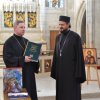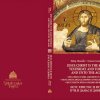On Saturday 16 April, His Grace Bishop Maxim of the Western American Diocese of the Serbian Orthodox Church visited the Orthodox School of Theology at Trinity College and presented a new book published within his diocese entitled The Christian Heritage of Kosovo and Metohija: The Historical and Spiritual Heartland of the Serbian People.
Bishop Maxim spoke about the efforts of the Serbian Orthodox Church to preserve its centuries-old monuments and the Christian heritage of Kosovo and Metohija.
The Serbian choir 'Kir Stefan Srbin' and a choir of girls from Kosovo also performed at the event.
Following the book launch, a pan-Orthodox Vespers service was held in the chapel.
Source: Orthodox School of Theology at Trinity College





